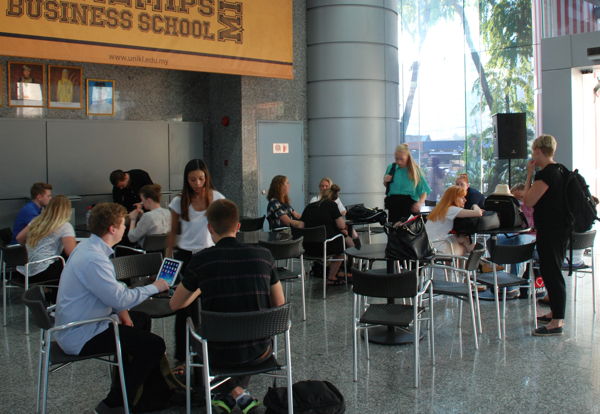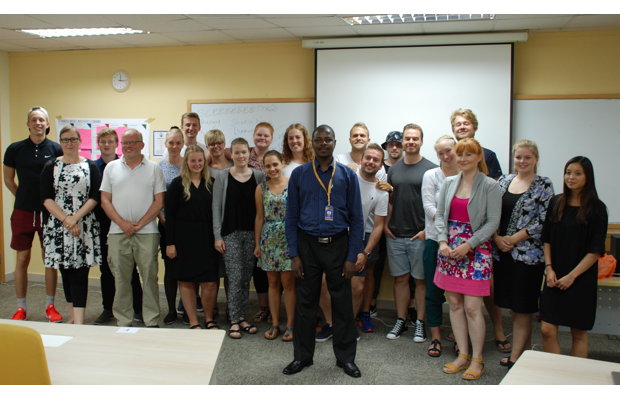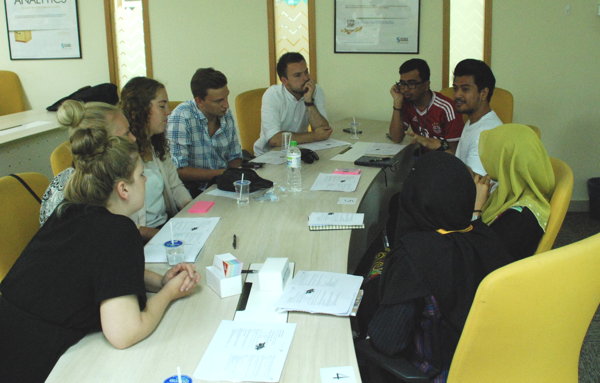Denmark’s Ambassador to Malaysia, Nicolai Ruge, paid a visit to this year’s Summer School ‘Doing business in Malaysia’ by Business Academy Aarhus (BAAA), held in collaboration with the University of Kuala Lumpur (Uni KL) between 26 July to 7 August 2015.

The Ambassador met with and welcomed the exchange students and teachers from Denmark and spoke to them about the importance of global internationalization, highlighting the emphasis on critical thinking in the Danish education system.
Besides getting experience with studying abroad, you will be introduced to working across disciplines with students from different educational backgrounds.
BAAA encourages its students to spend time abroad during their educational programme and in that regard a summer school can be a good way to experience a different culture and learn about a new academic field. These are intensive programmes where participants study across disciplines and with both BAAA students and students from local partner universities.
This summer school is focused on the issues that international companies meet when they plan to do business in Malaysia. The subject content is related to business and communication and includes Industry, finance and company structure in Malaysia.
Lecturing is based on theory that is carried out in practice-based cases and company visits, enabling the students to use their knowledge to analyse the market opportunities seen from an international company’s point of view.
“BAAA is a university of applied sciences where we apply knowledge and theory. This means that we always have a real-world approach and always use real-world cases when we teach. Uni KL has a similar approach, which is why we have a perfect fit,” explains Mads Hedelund, Head of International Office, BAAA.
“Two weeks is time enough to get a good basic understanding of a foreign market and a new (multi)culture like the Malaysian. However, we also offer our students the option to stay in KL for a 4-month semester as an exchange student. This gives students a much deeper understanding of Malaysia,” he added.
The reason why BAAA has selected Malaysia is that it sees it as the perfect Asian destination for students.
“You get all of Asia in one English-speaking country. You don’t get that anywhere else. In addition to this, academic quality is high in Malaysia.”
Danish and Malaysian lecturer work together on the academic programme, making sure both Danish and Malaysian students are challenged and learn for their cross-cultural collaboration.

Two participating students shared their assessment of the course as follows.
Benjamin Bracht, student of the PBA in International Business & Marketing. PBA is a “top-up” of 1,5 years to his former education.
With no plans for any further education in the foreseeable future he replied: “I wanted to try something different while I still had the chance, study-wise. Furthermore, I decided to go to Malaysia because it sounded like and awesome experience, and because I like exploring different cultures, and getting to know new and interesting people; both Danes and Malaysians.”
On gained insights into challenges for an international company entering to do business in Malaysia: “If I were to go to Malaysia and do business, I would surely have to get used to the relaxed way of looking at timelines. And when talking about theory, I would go with the Culture Shock Model, because it would take me a heck of a long time getting used to this relaxed way of living. Hence, I would probably be stuck in the bottom for a long period of time. The best example I can give, was that we waited an entire hour on a bus on our way to a company visit, because some students didn’t show up on time. If this would be the case in the business world, I would have a hard time arranging meetings, meeting hours for employees and so on.”
Prior to this summer course Benjamin had never desired to visit the country.
“For me, it just isn’t the country I think of when wanting to go on a vacation. And one of the reasons I chose Malaysia was because I thought that this maybe would be the only opportunity for me to go there – seeing that it isn’t that big of a tourist destination for Danes.”
About the course as such he evaluated: “Personally I wasn’t that satisfied with the way of studying in Malaysia. I’m not a big fan of the teachers giving lectures for 3-6 hours in a row, it gets quite tiresome for me – and I know a lot of my fellow Danish students feel the same way. In Denmark we interact in the lessons and that is the way I prefer to get educated. However, I never got to ask the question to any of my fellow Malay students, if, on the other hand, they found our way of educating boring or too confusing.”
The course did not make him more curious about Malaysia and a future career in the region.
The thing that made me interested was the Malaysian students. They were all so incredibly nice to us, and helped out whenever we needed any, and arranged trips for us when we wanted to go somewhere. And actually that goes for all the Malaysians I talked to. Also, I found it very funny to talk about the different perspectives on culture differences with the students. They found it awfully weird that we use a knife and fork when eating, when they instead used their hands – this I found to be awfully messy, but I tried it though,” Benjamin gave as example. Career-wise he believed he would not be able to cope with the hot weather.
“If I were to start career there, it would definitely be because of the people, not because of the country in itself.”

Malene Leth-Espensen, student of Financial Management and Services; a 3,5-year bachelor’s programme.
Malene on the other hand got more curious about Malaysia based on the course. She loves to travel to experience other cultures hands-on and saw the course as a great opportunity to study abroad.
“If I get the chance to work in Malaysia in the future I will consider it. Malaysia is an interesting country with very friendly and kind people. The local students were very curious and interested in our lives in Denmark.”
She too appreciated their arrangements and hospitality.
“They really made us feel comfortable and welcome in Malaysia. It was a very positive experience and I would love to come back in the future.”
For her this course was a great opportunity to experience a different culture and work together with both local students and BAA students who are studying different courses than herself.
“I think it is instructive to study with a variety of students possessing different competencies due to different academic backgrounds.”
She also thought it was a good way to get knowledge about Malaysia as well as doing business in a foreign market and getting an understanding of some cultural issues there might be in a context like that.
“We had academic sessions in Islamic Finance, Islamic Banking, Islamic Capital Market, Wealth Management and Takaful. Furthermore, we had academic sessions in different cultural theories. The visit to Maxis Head Office and Impact Hub made us aware of some of the challenges that might arise for a foreign company entering Malaysia. Our stay in KL did also contribute to our learning process; we got a lot of cultural inputs and saw the differences between our two countries,” Malene shared about ‘Doing business in Malaysia’ insights.
During the course she observed three dimensions from Geert Hofstede’s cultural dimensions theory (a framework for cross-cultural communication), as good to have in mind when going to do business with Malaysia.
“The power distance in Malaysia is very high,” Malene had discovered. “This is a huge cultural difference from Denmark where you might argue that the power distance is smaller. With this in mind the visit to Maxis Head Office was interesting. Maxis had been through a huge development in a short time. They have been a traditional company, with a hierarchical structure, a big office to the boss and different benefits to employees. But now the environment in Maxis is similar to the environment we know from a majority of large Danish companies.”
“Besides a high power distance in Malaysia the individualism is low and the masculinity is high so if you are planning on doing business in Malaysia you have to be aware of that. Furthermore, we were told that religion and relations are very important in Malaysia so it can be a challenge but besides that Malaysia is welcoming businesses, the tax rate is low and people are very friendly and helpful.”
She would definitely recommend the course to others.
“You can read a lot about cultural differences and the issues that international companies meet when they plan to do business in Malaysia on their own, but I believe you get the best understanding and insight experience of a country and a culture like this. Two weeks are a bit short to fully understand the subject, but during my stay in Kuala Lumpur I got a lot of cultural shocks and inputs. It has been a great experience.”

